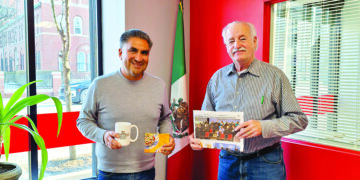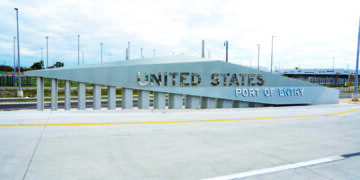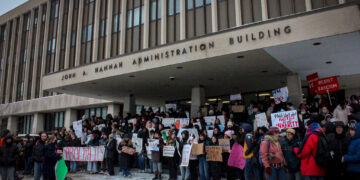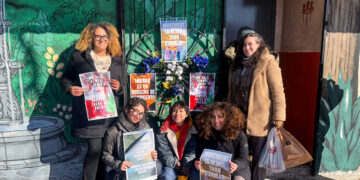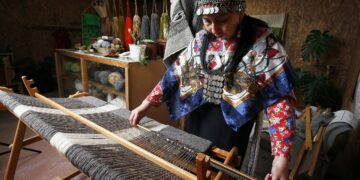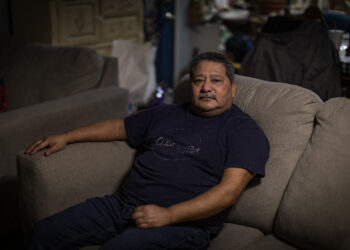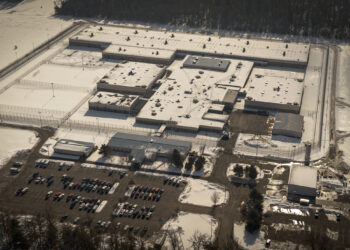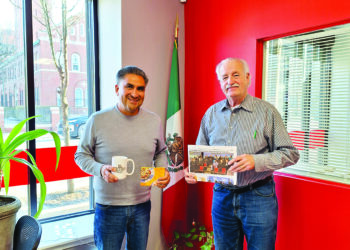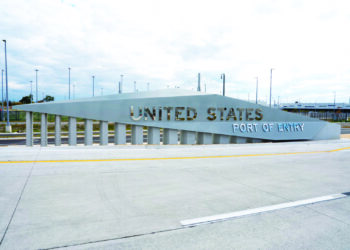Mayor Mike Duggan and Councilwoman Gabriela Santiago-Romero joined the Southwest Detroit Business Association (SDBA) and Cinnaire Solutions on Friday, March 31 to break ground on La Joya Gardens — a mixed-use, mixed-income residential and commercial building that will be located at 4000 W. Vernor Hwy. in Southwest Detroit.
La Joya Gardens is the latest project supported by the Strategic Neighborhood Fund (SNF), a partnership between the City of Detroit, Invest Detroit, neighborhood residents and corporate donors. SNF funds community-driven projects, each of which begins by soliciting input from residents. SNF, with assistance from PNC Bank, funded the community engagement process for the project, and provided $1.6 million in gap funding, which supports the deep affordability of the units.
“In neighborhoods across Detroit, the Strategic Neighborhood Fund is helping us build new affordable housing and bringing new life to our historic commercial corridors like West Vernor,” Mayor Duggan said. “Ten years ago we had a fire on this site, which left a hole in this vibrant neighborhood, but thanks to SDBA, Cinnaire Solutions and the SNF, it will once again be thriving and a beautiful place for Detroiters and small businesses to call home.”
La Joya Gardens is a $24 million development that will offer 47 one-bedroom and six two-bedroom apartments, with 42 reserved as affordable for those earning 30% to 80% of the area median income. That translates to rents as low as about $500 a month for a one-bedroom. When it opens next summer, the development will also offer some 6,000 square feet of retail space and 1,500 square feet of flexible community space on the ground floor with indoor and outdoor seating that will be a welcoming space for social gatherings and special events. As part of this vibrant development in the Hubbard Farms Historic District, a lush, landscaped plaza will be adjacent to four street-fronting retail spaces, as well as a 500-square-foot café that will be available for rent by Southwest Detroit-based businesses and entrepreneurs.
“My six policy priorities include housing and equitable development, so I am thrilled to be here today to celebrate the groundbreaking of La Joya Gardens. Projects like these are what transform our neighborhoods,” said Council Member Gabriela Santiago-Romero. “When we leverage funding to invest in real estate that becomes an affordable home to residents and provides opportunities for small business owners to realize their dreams of a brick-and-mortar location, we all win.”
La Joya, which means “jewel” in Spanish, was a name chosen as the result of a community “name the project” contest. Local resident Carolina Jimenez, who lives only blocks away on 25th St. submitted the winning entry. Ms. Jimenez noted that La Joya is the name of a popular ranch or “hacienda” near her small hometown in Jalisco, Mexico.
“Today’s groundbreaking marks a pivotal moment for La Joya Gardens, an exciting development project that will not only add high-quality, affordable housing and community space for local residents to enjoy, but also prime retail space along one of the city’s most vibrant commercial corridors,” said Laura Chavez-Wazeerud-Din, SDBA’s Vice President of Programs & Compliance. “We are immensely grateful to all of the development partners who helped bring our community’s vision to fruition.”
Designed by SITIO Architecture + Urbanism, the mixed-use development brings urban vitality to an entire city block along West Vernor Highway that has stood vacant for more than a decade,” said Chris Laurent, president of Cinnaire Solutions. “Through our service, we hope to further enhance the lives of residents in the community.”
The project is the end result of an extensive community engagement process. In 2018, the development team kicked off the project with a six-month “participatory design” phase in which nearly 200 local stakeholders met with the planners and architects in a series of meetings and focus groups. Residents and local businesses voiced their suggestions and voted on the building’s design elements, types of businesses and community services they wanted to see.
Local architect Luis Antonio Uribigan of 511 Design and Janet Ray of the planning and evaluation firm Mission Lift, co-led the community engaged design process.
“La Joya brings together what the community wanted to see in this building through a long process,” said Uribigan. “The main focus point of the project and central piece of the development actually got its color patterns from tile in our Southwest community and the setback eased some fears that the four-story building would be too imposing. We are very happy SITIO was able to balance modernity with historic reverence.”
Planning for the project began with a blank page that was filled in by local residents. “La Joya Gardens was a beautiful example of community engagement combined with data driven decision making,” said Ray. “Our data analysis allowed residents to make decisions about their community. One priority was how to make La Joya a welcoming space for all. The highest response we got was to follow the ‘culture of Southwest Detroit. Be friendly and speak multiple languages,’” she noted.
Invest Detroit, which administers the Strategic Neighborhood Fund, is a key partner and investor.
“SNF is creating real momentum in Detroit’s neighborhoods,” said Keona Cowan, Executive Vice President, Lending for Invest Detroit. “Residents are excited about this project. It will spur more investment in the area, and Invest Detroit and SNF are excited about opportunities to fund more projects along West Vernor, the main street of Southwest Detroit.”
The City of Detroit’s Housing & Revitalization Department (HRD) invested $2.36 million in La Joya Gardens through HOME and the Affordable Housing Development and Preservation Fund.
“Projects like La Joya Gardens are so important because they not only create new affordable housing, but revitalize our commercial corridors and make our neighborhoods more engaging places to call home,” said Julie Schneider, director of HRD. “The deep affordability La Joya will bring is also essential in our efforts to build back neighborhoods everyone can afford to call home.”
Additional funding for La Joya Gardens also includes a $12.4 million 4% and 9% Low Income Housing Tax Credit (LIHTC) investment from Cinnaire; a $3.2 million loan and a $588,647 HOME/House Trust award from the Michigan State Housing Development Authority (MSHDA); a $500,000 Affordable Housing Program (AHP) Award from the Federal Home Loan Bank of Indianapolis; $1.6 million investment from Invest Detroit through the Strategic Neighborhood Fund; and a $500,000 investment from the Detroit Economic Growth Corporation.
Other partners helping SDBA and Cinnaire Solutions in making La Joya Gardens a reality include 511 Design, the Detroit Economic Growth Corporation, Detroit Housing Commission, O’Brien Construction, and Flagstar Bank.











